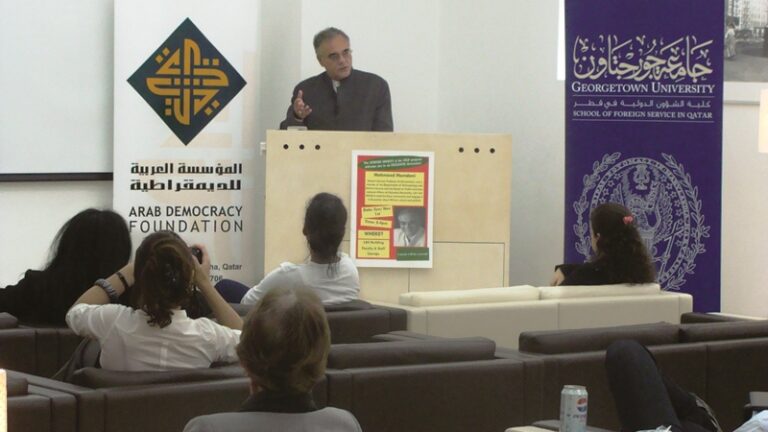Dialogue Series, Race & Society, Regional Studies
Mahmood Mamdani on "Mass Violence and Reconciliation"

On November 1, 2009, Mahmood Mamdani, Herbert Lehman Professor of Government and Professor of Anthropology at Columbia University, gave a lecture to Georgetown students, faculty, and staff. The event was sponsored by the Georgetown University-Qatar Culture and Politics (CULP) program, headed by Professor Rogaia Abusharaf, the Georgetown University-Qatar African Society student club, and the Arab Democracy Foundation. Mamdani began the lecture by explaining that much of his recent work focuses on issues of mass violence and reconciliation, such as the historical events that took place during the apartheid era in South Africa, the genocide in Rwanda, and, more recently, in Darfur. In order to contextualize these events during his research, he noted that he began by examining various human rights organizations and their writings and, he said, became increasingly skeptical about the data and the means of presenting these findings to the international community.
Over the years, Mamdani said, many of the most respected human rights organizations have developed formulaic patterns of research, the purpose of which is to identify the perpetrator, first and foremost, and then the victim. At the heart of this approach, he said, is a demand for punishment and for these atrocities to be treated as crimes. Mamdani explained that “if you look at conflict situations in the African context, what you confront is not just a set of events, but you confront a cycle of violence – an ongoing cycle of violence.” When the Rwandan genocide is placed in this context, the victim and perpetrator trade places as each side has a victim narrative, he argued. Human rights literature advocates punishment as a means of ending cycles of violence, but the core issue itself, why the violence arose in the first instance, is not fully addressed. There are two ways of approaching the core issues of any conflict situation, Mamdani said. One way is to blame the perpetrator as an explanation of the violence and to point to the psychology, identity, or culture of the perpetrator as being the reason for conflict. He argued that “the tendency to define victim and perpetrator in absolute terms has lent itself to a demonization process and, ironically, one of the worst tendencies in the human rights movement, which drives it to demonize perpetrators, undercuts it.” He argued that “the framing in terms of crime and punishment, basically says that the only solution to violence is more violence – the only difference being, theirs is bad violence and ours is good violence; ours is the violence meant to stop violence.”
Currently, the paradigm of how to deal with mass civil conflict is a result of the Nuremberg trails, which maintained that “political orders are not a sufficient excuse and that every individual and state official must take full responsibility for what they have done.” He added that “the Nuremberg model was based on two assumptions: one assumption was that the conflict has ended – there is a victor and, therefore, crimes can be de- fined, identified, and punished under the rule of the victor.” The second assumption “is that perpetrators and victims will not have to live together.” But in the case of South African apartheid, neither of these assumptions held true, “there was no victor” and “there was no Israel for the victims” as both oppressor and oppressed had to live alongside each other after the cessation of apartheid. In this instance, there was a need to “decriminalize” the oppressors and their policies, and “treat them as political adversaries.”
South African apartheid was a problem of “the definition of political society.” Indeed, “in this context,” he argued, “part of the challenge was the founding of a new political society; a foundation which would lay the basis for the rule of law.” Therefore “part of the trade-off was that there would be no criminal trials.” Mamdani said that “the focus was on political justice, not criminal justice” and that is why “the South African model is more relevant to the kind of post-colonial conflict in African situations, which is actually about the foundation of a new political order.”
Concluding with his thoughts on the situation in Darfur, Mamdani argued that through modern movements such as the Save Darfur campaign, there has been a tendency to “commoditize” the conflict through celebrity publicity, a dramatization of events, and an emotional appeal to the international community, rather than addressing the political problems and explaining the issues.